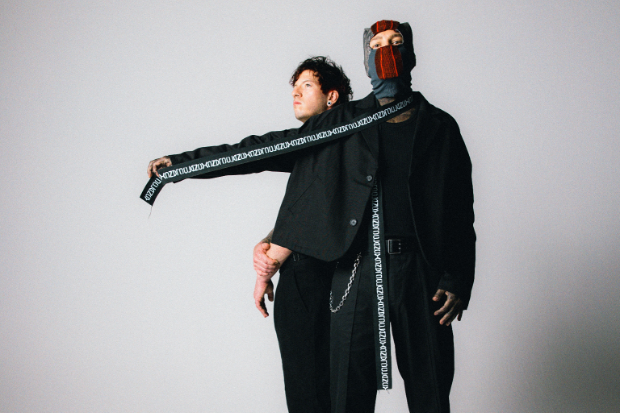
Ashley Osborn

Audio By Carbonatix
In September, NPR proclaimed that rock isn’t dead after Twenty One Pilots’ Breach placed No. 1 on Billboard’s top 200 album chart, earning the biggest sales week ever for any rock album in six years. And the comments were colorful, to say the least.
“Calling them ‘rock’ reinforces that it is dead,” read one of the Facebook comments.
Others said Twenty One Pilots defy categorization and aren’t specific to one genre.
Earlier this year, Sleep Token and Ghost had chart-topping albums for the first time with Even in Arcadia and Skeletá, respectively. Neither of the bands can be solely described as rock since they both incorporate heavier elements like metal, but it’s still a win for guitar-forward music.
For many years, critics and fans alike have debated, argued and criticized the demise of rock in the cultural zeitgeist. Rock isn’t dominating streaming platforms or occupying top spots for music awards, but the genre exists in unique forms if you look beyond industry markers like chart rankings and the Grammys.
There’s Mannequin Pussy, which injects a fierce punk attitude into catchy choruses, or the underrated Nova Twins’ shift into pop, R&B and electronic while still dishing out the riffs. Hardcore-meets-alternative rock band Turnstile blew up and continues to bridge the two worlds. Austin’s Die Spitz delivers a gloomy take on hard rock with hints of punk, while King Gizzard & the Lizard Wizard serve up gritty psychedelic rock. Meanwhile, Wet Leg implements a witty take on indie rock, and there’s the artsy weirdness of rising act Geese.
Plenty of veteran bands like Arctic Monkeys, Foo Fighters, Queens of the Stone Age, Cage the Elephant, The Black Keys and Greta Van Fleet still partake in arena tours, but why are there not as many big rock acts as there were decades before?
When Nirvana’s sophomore album, Nevermind, exploded in 1991, led by the single “Smells Like Teen Spirit,” radio and MTV were the ultimate tastemakers of popular music. This was still years before Napster made music that allowed users to download music tracks for free.
“When the video hit MTV, it made a big difference. That’s when you’d show up to a 500-capacity gig and there were 500 extra people there,” Dave Grohl said in an interview about Nirvana’s rise to fame after “Smells Like Teen Spirit” premiered on MTV. Heavy rotation on the radio, especially rock and college stations, cemented the single’s success even further.
Part of Nirvana’s appeal was its divergence from the polished glam of the ‘80s. Instead of singing about hot chicks and partying, artists strived to reflect their personal realities — feelings of alienation, discontent with society and inner turmoil.
The underground subculture of disaffected youth had a platform to air out their frustrations through emotionally charged bands like Alice in Chains, Pearl Jam, Soundgarden, and, of course, Nirvana.
Other bands in the alternative scene, such as Smashing Pumpkins, Hole, L7, Pavement, Jane’s Addiction and countless others, ushered in a new wave of groups with an edge and more than a few distortion pedals.
In the late ‘90s, another technological component arrived: Auto-Tune. Suddenly, any off-key notes could instantly be morphed into perfect pitch. Auto-Tune also produced a more noticeable “robotic” vocal effect popularized by Cher’s hit single “Believe” in 1998.
Now it’s standard to hear near perfection in digital recording, no matter the genre. For genres like pop or electronic, the effect blends in seamlessly, but rock and roll was originally built on rebellious, rough-around-the-edges intentions. Perhaps one explanation for rock’s decline in popularity is the pervasive use of pristine production and mixing that’s sanitized and neatly packaged for the masses.
Another explanation could be that Gene Simmons believed “rock and roll is dead” due to the digitization of music that spearheaded a new era of streaming.
“Unfortunately, the business model is dead and new bands don’t have a chance, especially rock bands,” he told Bill O’ Reilly. “Rock and roll is dead because the freckled-faced kid next door to you, who is a good kid with a good family and everything, has become entitled—feels entitled to be able to download and file share and get all of this music for free.”
Just like Nirvana’s resistance to what had come before, there are, of course, bands defying the norm. There’s no shortage of alternative acts paving their own path. They just aren’t packing huge venues.
Gen Z has kick-started the resurgence of nu metal and shoegaze by using the bands’ songs in TikTok videos (go to any Deftones concert and you’ll see teens and adults in their early 20s dressed like they’re at a Korn show in 1999). Combine the adoration for a long-gone era with a playground of recording equipment and the Internet, and suddenly bands deliver styles unbound by parameters. The unlimited access to music all around the world from any era has changed the landscape of what genre means.
Dallas’ own UnityTX utilizes nu metal, hip-hop and electronica in new ways. DIIV has continued to shapeshift through indie rock, shoegaze and post-punk.
The limitless possibilities of exploration have taken the guilt out of guilty pleasures. Listening to Minor Threat and then Sabrina Carpenter? Sure, why not? Just take a look at Amoeba Records’ What’s In My Bag? series on YouTube to see further proof.
Guitar music is never going to completely disappear. Midway through the year, it was reported that rock is now among the fastest growing genres in the U.S, outpacing both Latin and country music. A comeback is imminent. Trends within genres are cyclical, and soon enough, another subgenre will stir up interest again. Predictions can’t be made right now about what will come next when bands are more welcoming to more varieties of influences and sounds.
Rock isn’t dead, it’s just reinventing itself.